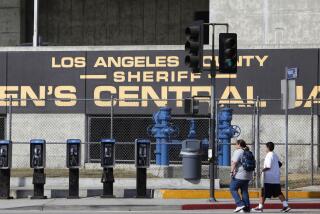It’s time to figure out oversight of the L.A. County Sheriff’s Department
Is the crisis at the Los Angeles County Sheriff’s Department over? Or, to put it another way, has the opportunity to reform the department passed?
Sheriff Lee Baca left office at the end of January, the Board of Supervisors appointed John Scott to fill the rest of Baca’s term, and voters will pick a new sheriff in either the June 3 election or a Nov. 4 runoff.
Every recommendation of a Citizens’ Commission on Jail Violence is in some stage of implementation. There is a seasoned corrections professional, Terri McDonald, in charge of the department’s jails. The board appointed an inspector general, Max Huntsman, and he is doing his work. Twenty sheriff’s deputies are under indictment on corruption and civil rights charges. More indictments may come, and other fallout will continue in the form of court judgments, monetary settlements (at taxpayers’ expense), perhaps even some housecleaning at the department.
The arrogance and defiance that led to abuse in the county’s jails -- abuse of inmates, certainly, but abuse as well of deputies who objected to a culture of cliques and secrecy, and abuse of the public trust -- will likely have a role in the coming elections. Each candidate will compete at least in part to present himself as the best antidote to the ways of the past.
So are we done? Did the system work? Baca certainly didn’t plan for his career to end this way, but his resignation almost seems to have followed the process he laid out for the jail violence commission when asked what the appropriate solution would be if it turned out that he was responsible for the department’s problems.
And here we are. Baca beat voters to the punch, not seeking reelection, resigning before the end of his term, calling himself the past instead of the future. Or perhaps it was the reality of the probes, the lawsuits and the bad press that beat Baca to the punch, but the result is the same: Less than four years after cruising to reelection without even drawing an opponent, he was forced from office. Baca said the solution was for voters not to elect him, and now they won’t be electing him. They’ll be electing someone else. And then, perhaps, moving on.
So before we move on, let’s be clear. We are not done. The system did not work. The system, in fact, is at the core of the culture that pervades the Sheriff’s Department even in years in which the anguish of abused inmates and their families, the outrage of deputy cliques with their own gang-like tattoos and codes of silence, the astonishing number of deputies arrested for drunk driving don’t make it to the headlines or don’t catch the interest of voters.
The system of an elected sheriff in a county of 10 million people, the vast majority of whom aren’t served by his deputies and need not pay attention to his department’s travails, is an anachronism.
But of course, that invites a host of questions: If the sheriff isn’t elected, who should appoint him? Would the Board of Supervisors, also protected by a veneer of democracy without facing any serious electoral challenge, do a better job of running the Sheriff’s Department than the sheriff? Would the supervisors be better at picking a sheriff than they were in recent years at picking a chief probation officer or a director of the Department of Children and Family Services? What is the value of added accountability if the sheriff merely is subject to the direction of others who are virtually unaccountable?
And are there steps that we could take now, without statewide votes and constitutional amendments, that would recalibrate the tension between the sheriff’s accountability and his independence?
Los Angeles County Supervisor Mark Ridley-Thomas introduced a motion last September, when Baca was still in office and still considered likey to be reelected, that would create a five-member citizens oversight commission, appointed by and reporting to the Board of Supervisors. Gloria Molina seconded it. But Ridley-Thomas has repeatedly pulled the matter from the agenda, suggesting a struggle to find a third, and winning, vote.
The matter is on the calendar to come before the board again next Tuesday -- but to date there has been little public discussion of the proposal’s merits and pitfalls.
It’s time for that discussion. Some of it must necessarily be wonky, dealing with balances of power and political theory; and some of it must be mercilessly pragmatic (why, for example, would any elected sheriff ever pay such a commission any mind?). Let’s walk through the questions and seek out the answers -- here, in this space, Wednesday, Thursday and again Friday, and on through the coming days and weeks.
There is no better time for such questions. Seven candidates (so far) are vying to succeed John Scott as the next sheriff, and their answers about an oversight commission could tell us a lot about how they view the power and the potential of the office they are seeking.
ALSO:
Gun control made harder in California
Make the Ventura Freeway safe for mountain lions too
North Korea’s atrocities: What is the world going to do? Not much.
More to Read
A cure for the common opinion
Get thought-provoking perspectives with our weekly newsletter.
You may occasionally receive promotional content from the Los Angeles Times.







